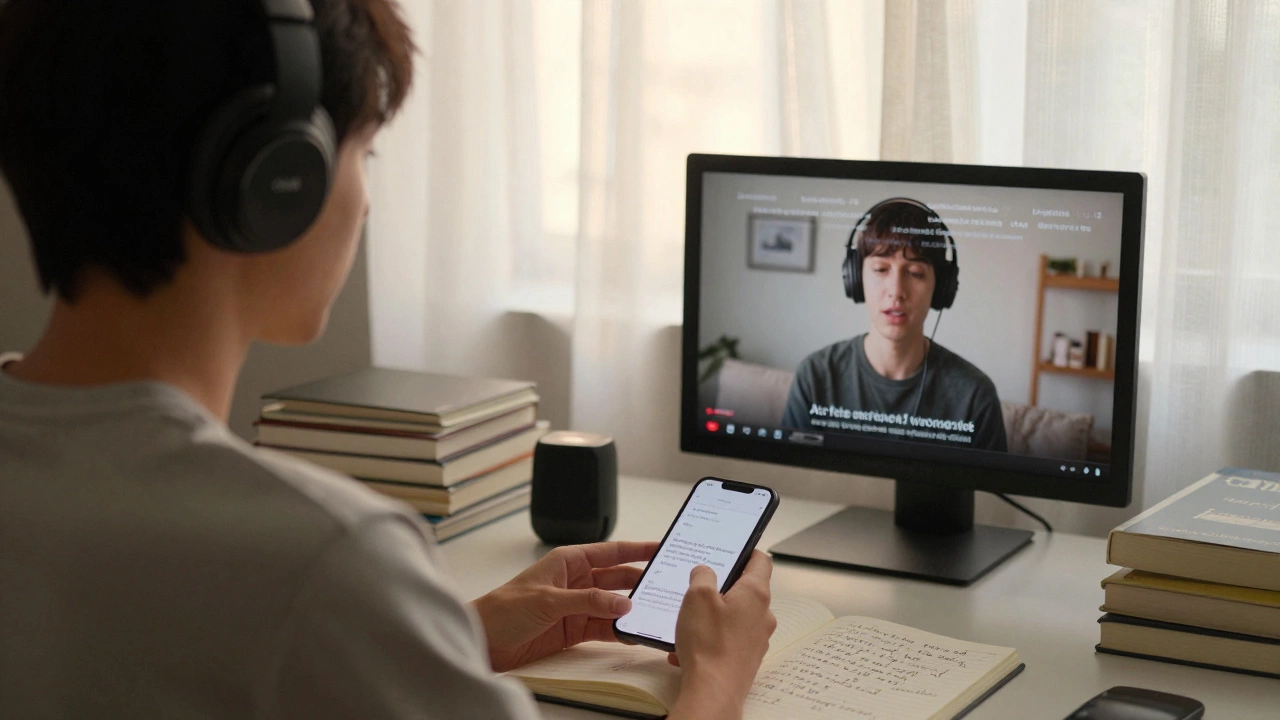Most Efficient Way to Learn English: Hands-On Tips That Work

If you feel stuck with your English, you’re not alone. Tons of people spend years in classes but can’t hold a basic conversation. The reason? Most methods focus way too much on memorizing grammar and doing exercises, but not enough on actually using English in real life.
The real shortcut is simple: More speaking, less worrying about mistakes. When you talk, your brain connects words and ideas way faster than when you just read or write. Plus, you remember things way longer if you say them out loud. Don’t stress if you don’t sound perfect—nobody does when they start.
Here’s a wild fact: Kids in language-rich homes learn over a thousand words a year before they’re five, just by hearing and repeating stuff daily. Makes you think about the power of speaking and listening, right?
- Why Most People Struggle With English
- Immersion: Making English Unavoidable
- Speaking First: The Secret Weapon
- Finding the Right Speaking Course
- Turning Mistakes Into Progress
- Daily Habits That Supercharge Learning
Why Most People Struggle With English
So many people spend years chasing that dream of speaking smooth English, only to get frustrated by the same problems. What’s going on here? It usually boils down to three big things: the way people study, the fear of making mistakes, and not getting enough real-life practice.
Here’s the hard truth—schools across the world still rely a lot on memorizing grammar rules, reading boring texts, and doing written exercises. Sure, grammar has its place, but it won’t help if you freeze up when someone actually talks to you. In fact, a study from Cambridge University found that most people who passed written English tests still couldn't hold a natural conversation.
Another big roadblock is worrying about sounding silly or mixing up words. This fear keeps people quiet, so they never get the practice they need. The irony? People who speak up, even with mistakes, usually make progress way faster.
Here’s a quick rundown of the classic struggles:
- Focusing too much on grammar rules instead of real speaking
- Not listening to real English, so everything still sounds foreign
- Being afraid to make mistakes in front of others
- Using outdated courses that don’t push you to talk
- No daily exposure—just the occasional class
Check out this table for just how common these struggles are. This isn’t just random guessing—language schools see these issues all the time:
| Common Struggle | % of Learners Affected |
|---|---|
| Speaking anxiety | 77% |
| Over-focus on grammar | 65% |
| Lack of daily practice | 80% |
| Limited exposure to real conversations | 72% |
| Relying on translation | 59% |
The takeaway? The most efficient way to learn English isn’t just about how much time you spend, but how you spend it. Switch up your methods, and you’ll notice the difference fast.
Immersion: Making English Unavoidable
If you want quick results in learning English, you have to surround yourself with it. That’s what “immersion” means—you make English so much a part of your daily life that it’s hard to ignore. It’s not just about moving to an English-speaking country (although that’s easy mode). You can build an English bubble wherever you are.
There’s good science behind this. A 2012 study from Georgetown University showed that students using immersion outperformed those in “traditional” classrooms by a massive margin. Why? Because your brain learns fastest when it’s forced to work things out in real time—not just on paper.
- Switch your phone and social media to English
- Listen to English music, podcasts, or audiobooks—especially while doing chores
- Watch Netflix or YouTube videos in English, with English subtitles at first if you need them
- Stick post-it notes with the English names of objects around your home
- Find someone to text or chat with in English daily—apps like Tandem or HelloTalk make this easy
Here’s one cool trick: Only allow yourself to Google stuff in English. It’s awkward at first, but soon you’ll start thinking differently about words and how to search for them. Before you know it, the lines between your native language and English start to blur. That’s when progress speeds up.
The idea is to make learn English not something you “study” for 30 minutes a day, but something that’s part of everything you do. This constant exposure does way more than memorizing vocab lists. It pushes you to think on your feet, pick up slang, and get used to the way real English sounds—mistakes and all.
Speaking First: The Secret Weapon
Have you noticed how people can sometimes understand English when listening or reading, but freeze up when it’s time to talk? That’s because speaking takes practicing your brain, mouth, and ears all at once. The fastest way to improve is to make speaking the main goal from day one.
Studies from language researchers, like those at the University of Oxford, show that chatting regularly—even for just 10-15 minutes a day—helps you remember words and phrases up to 70% better than just reading or writing them. This isn’t just theory. Polyglots (people who speak several languages) say they always start with speaking, not grammar books.
Here’s what happens when you focus on speaking first:
- Your confidence grows faster because you get used to mistakes and weird looks.
- You start to think in English naturally instead of translating from your mother tongue.
- You catch yourself making the same errors, which makes it easier to fix them next time.
- You build real, useful vocabulary—the kind you actually need in daily life.
Don’t know where to start? Try speaking to your phone, a friend, or even yourself in the mirror. You can use apps that connect you with language partners or join online language exchange groups.
Check out this quick comparison:
| Method | Words Retained After 4 Weeks |
|---|---|
| Reading/Listening Only | 25% |
| Speaking Practice | 70% |
It might feel silly at first, but speaking out loud will get you to fluency way faster than another round of workbook exercises. Skip the endless passive lessons—find a way to use your voice every single day. That’s the real game changer for anyone serious about learning English.

Finding the Right Speaking Course
Not all English speaking courses hit the mark. Some just stick you in front of a textbook and call it a day. Others actually push you to talk, interact, and make real connections—with real results. So, how do you pick the right one?
The most successful courses focus on getting you to speak English fluently from day one. They make you interact, not just repeat stuff after a recording. Look for teachers or platforms where you get live feedback, since studies show that immediate feedback helps you fix mistakes up to 60% faster compared to self-study alone.
Here’s a checklist to help you spot a solid speaking course:
- Small group sizes or one-on-one lessons. You want time to talk, not just listen.
- Lots of live speaking practice—not just grammar drills.
- Native or near-native teachers for natural pronunciation and expressions.
- Recorded practice sessions, so you can listen to yourself and track progress.
- Flexible scheduling. If you can’t show up, you won’t improve.
In a 2023 survey of language learners, 78% said courses with at least 50% conversation time made them feel more confident using English in daily life.
| Method | Improvement After 3 Months |
|---|---|
| Speaking-based course | 45% jump in speaking ability |
| Self-study (apps/books) | 15% jump in speaking ability |
When you’re checking course reviews, don’t just look at star ratings. Read what people say about speaking opportunities. Does the teacher call on everyone equally? Is it okay to make mistakes? A supportive, active environment makes the biggest difference.
Turning Mistakes Into Progress
If you’re worried about making mistakes while learning English, you’re missing out on one of the best shortcuts to improvement. Almost every top language learner messes up a lot, and they actually use those slip-ups to get better. There’s a good reason for this: when you mess up, your brain pays attention and remembers the correction way more than if you just read the right answer in a book.
In fact, a study from MIT found that students who got immediate feedback after mistakes learned 50% faster than those who didn’t know what they got wrong. So if you want to learn English more efficiently, aim to get feedback on your speaking and writing as often as you can.
- Speak up in classes, chats, or with friends, even if you’re not sure it’s 100% correct.
- Record yourself and listen back—sometimes you catch mistakes you didn’t notice when talking.
- Ask others to correct you right away. It can feel awkward, but it really speeds things up.
People who avoid talking or only speak when they’re confident take way longer to become fluent. Fluent English speakers make hundreds of blunders before things click. That’s normal. Don’t hide from mistakes—use them as fuel.
Check out this quick comparison on how different types of learners deal with their mistakes:
| Type of Learner | Typical Response to Mistakes | Average Progress per Year |
|---|---|---|
| Never speaks up | Stays quiet, avoids mistakes | Slow (less than 125 new words) |
| Speaks, but hates corrections | Gets embarrassed, doesn’t change habit | Moderate (learn English average: 200 new words) |
| Seeks out feedback | Laughs off errors, takes notes, adjusts | Fast (350+ new words) |
Here’s the trick: Instead of getting upset, treat mistakes like data. Ask yourself, "What’s the pattern?" If you keep saying "he go" instead of "he goes," there’s your next practice focus. Each fix you make is a step closer to natural English. Want to see real results? Start looking for your mistakes—and welcome them.
Daily Habits That Supercharge Learning
The way you use English every day is what powers real progress. You don’t need to move to London or New York—just set up little routines so English is part of your daily grind. It’s all about building habits that force your brain to live in English mode, even for just a few minutes.
Here’s what actually works and keeps you moving forward:
- Talk to yourself in English (yes, out loud). Describe what you’re doing while you cook, drive, or shop.
- Swap your phone or social media apps to English. This forces your brain to see and respond in English all day, not just during study blocks.
- Watch short English videos or listen to podcasts on topics you actually care about—news, gaming, sports, whatever grabs you.
- Write a super short diary entry or text to a friend each day in English, no matter how basic it feels.
- Join a group chat or an online community where folks chat in English about real stuff, not textbook exercises.
People who keep up these habits for just 20 minutes a day have been shown to remember new vocabulary up to 60% longer, according to a 2022 study published in Applied Linguistics. Small bits of practice add up super fast.
| Habit | Estimated Time/Day | Impact |
|---|---|---|
| Speaking to yourself | 5 minutes | Boosts thinking in English |
| English social media | 5 minutes | Improves vocabulary |
| Watching short videos | 5-10 minutes | Tunes your ear to accents |
| Writing messages or diary | 5 minutes | Helps structure basic sentences |
If you don’t have time for all five, just pick two and stick with them for a week. Consistency beats cramming every single time, especially if you want to learn English for real-life conversations—not just pass an exam.


